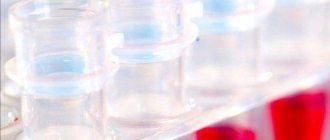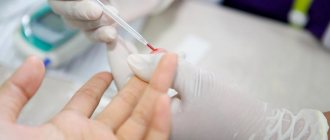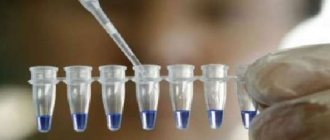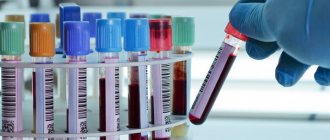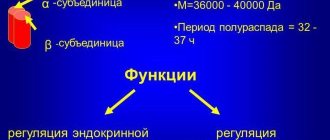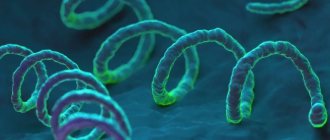What can affect CPK levels?
Specific enzymes are examined in the blood, by the amount of which doctors judge certain muscle injuries.
The levels of these specific enzymes, called CPK-BB and CVF-MB, may increase in the following cases:
- When muscle tissue is injured,
- After intense and active physical work, sports activities,
- As a result of poisoning,
- After drinking alcoholic drinks,
- For various pathologies of muscle tissue and in some other cases.
Chemical formula of creatine phosphokinase
Creatine phosphokinase (CPK) in the body
Creatine phosphokinase is an enzyme that accelerates the biochemical transformation of creatine and adenosine triphosphate into creatine phosphate. During this transformation, energy impulses are enhanced, ensuring full muscle contraction.
CPK contains two constituent molecules (B and M), which in different combinations form three isoenzymes, each of which is localized in a specific structure of the body and is responsible for its neuromuscular functionality. CPK isoenzymes:
- MM – isoenzyme of skeletal muscle cells (myocytes);
- VM is an isoenzyme of muscle fibers of the myocardium and skeletal muscles;
- BB is an isoenzyme of the nervous tissue of the brain.
CPK-BB is detected in the blood only in cases of vascular or cerebral pathologies. In a healthy state of the body, the isoenzyme is unable to overcome the barrier between the circulatory and central nervous systems (blood-brain barrier). CPK CM is an indicator of cardiac muscle contractions and the main diagnostic indicator of myocardial infarction. CPK MM makes up 98% of all creatine kinase.
Reference! The second name of creatine kinase - CK, or creatine phosphokinase, comes from the name of the biochemical process of correlation between creatine and adenosine triphosphate - phosphorylation.
What does the study reveal?
Analysis for CPK is necessary when it is necessary to diagnose the functioning of the heart muscles, identify the condition and existing pathologies, and dysfunction of skeletal muscles.
Based on the level of enzyme content, the origin of pain in the chest can be identified, and the analysis can also diagnose a heart attack.
Pathologies of the heart muscle can also be detected through research.
In addition to the listed pathologies, biochemistry is carried out to identify:
- Diagnosis of a heart attack, and at very early stages,
- Dermatomyositis,
- Inflammation of the heart muscle,
- Muscular dystrophy.
In addition, a timely blood test will help determine the effectiveness of the current therapy for cardiac pathologies.
What are the dangers of deviation from the norm?
Creatine kinase itself is not a toxic substance, so an excess does not pose any threat to the human body.
Serious threats to it are those diseases that caused an excess of this enzyme, for example, cancer, heart attacks, inflammatory processes in the muscles, various poisonings, and so on.
A lack of creatine kinase can affect the functioning of muscles and the nervous system . It causes muscle weakness, fatigue, dizziness, problems with attention and the ability to perform physical work.
Indications
A biochemical blood test for CPK is indicated for suspected myocardial infarction. The indicator allows you to identify this disease at its earliest stages.
In addition, an analysis is often prescribed for serious injury affecting muscle tissue, as well as if there is suspicion of the growth of a malignant neoplasm.
As for the specialists who can send you for analysis for CPK, these include:
- Cardiologist,
- Oncologist,
- Therapist,
- Endocrinologist,
- Neurologist.
This biochemical analysis is prescribed to all patients with any cardiac pathologies: this measure helps prevent myocardial infarction.
When is a test ordered?
There are quite a lot of reasons for research:
Muscle pain
Muscle discomfort is a clear and common sign of myositis. Local inflammatory process.
Against the background of this phenomenon, the concentration of CPK increases. The more intense the muscle damage, the higher the enzyme levels.
It is convenient to study fractions if you need to assess the dynamics of the state. For example, before and after treatment.
Alcohol poisoning
In this case, diagnostics are prescribed to examine the safety of energy metabolism. Ethanol, an alcohol, acts as a kind of inhibitor and slows down ATP synthesis. Paradoxically, CPK is growing at the same time.
As a result, muscle strength decreases and the metabolic rate in the brain decreases. If this phenomenon reaches critical proportions (for example, after heavy alcohol consumption, at the level of a lethal dose), irreversible changes are likely.
A study of the amount of creatine phosphokinase is designed to assess the degree of impairment. And then track how the recovery process is going.
Tachycardia, any abnormalities of the heart
Adenosine triphosphate (ATP), and therefore indirectly creatine phosphokinase, plays a key role in the functioning of the muscular organ.
Because without a sufficient amount of these substances, contractility would be impossible in principle. Any deviations immediately make themselves known.
In the early stages, the body tries to compensate for the violation using the accumulated reserve of strength. Own resources. The number of contractions per minute increases. Once the internal potential is exhausted, the heart stops beating with sufficient force.
Attention:
If the concentration of CPK continues to increase, and the myocardial function is also low, the organ’s functioning is likely to stop.
Doctors have the opportunity to catch pathology at its earliest stages. Although tachycardia develops for other reasons.
Rheumatic carditis
We are talking about inflammation of autoimmune origin. By its nature, such a disorder poses a danger to biochemical processes in general. As a result of a false response of the body's defenses, the concentration of CPK increases.
As the muscle layer is destroyed, isoenzymes begin to leak into the blood and no longer provide the internal resource and safety margin of the myocardium. How it ends is already clear. Cardiac arrest and death of the patient are possible.
Suspicion of stroke and recent acute cerebral blood flow deficits
Violations of the integrity of cerebral tissues. In the first case, the study indirectly confirms damage to the nerve structures. In the second, it allows you to determine the severity of the disorder.
The signs of a pre-stroke condition are described in detail here, and signs of a stroke - here.
Inflammatory processes
Any etiology. Mostly infectious. Toxins produced by bacteria, as well as those remaining from the destruction of the body’s own cells, inhibit and slow down the production of CPK. Based on the results of the analysis, one can judge the severity of inflammation.
High load on the myocardium
There can be many options for this. For example, sports training or physical, exhausting work. Categories of patients who face such stress are at increased risk.
In this situation, a blood test for CPK is prescribed as a preventive measure. Research needs to be done regularly. At least 2 times a year. Can be done more often as needed.
All deviations are a clear cause for concern. Energy metabolism must be maintained. This is where cardioprotectors and other drugs come to the rescue. That's another question.
The list of indications is far from complete. A blood test for creatine phosphokinase is prescribed for tumor processes to confirm the etiology of mental disorders. Whether it is necessary to take the test in a particular case is decided by a specialized specialist.
Where is blood taken for CPK analysis?
In this case, blood is taken from a vein. After the required amount of blood has been obtained, the material is sent to an equipped laboratory, where it is separated into serum and cellular parts. It is the serum fraction that is studied.
Studies of the content of keratin phosphokinase in the blood are carried out using a special device - a CPK photocolorimeter.
Such advanced laboratories as Invitro are necessarily equipped with this indispensable device. If the diagnosis requires clarification, a few days after the first blood donation, the doctor may prescribe a second one.
Norms
Note that when measuring the level of creatine kinase in medical practice, it is customary to use the abbreviation ED - which stands for unit of enzyme activity. Units are measured per 1 liter of serum blood fraction.
The level of creatine kinase in the blood varies significantly depending on a person's age, gender, and even race.
The general norm today is from 2 to 200 units per liter. For adult men, the norm for this indicator is 52-200 U/l, and for women - 35-165 U/l.
Standards for adults and children
| Floor | Age | Norms |
| Men | from 52 to 200 IU/l | |
| Women | from 35 to 165 IU/l | |
| Children | infants up to 5 days | up to 652 U/l |
| 5 days - six months | up to 295 U/l | |
| 6-12 months | up to 203 U/l | |
| 1-3 years | up to 228 U/l |
Preparation
There is no need to carry out any special preparation of the body to donate blood for CPK.
However, doctors insist that blood donation should be done on an empty stomach; in addition, taking medications and alcohol the day before is prohibited.
It is especially important to avoid taking medications aimed at lowering blood cholesterol.
If there is a need to take these medications, you must inform your doctor about this, since the presence of medications in the blood can greatly affect the test result.
If you can’t eat before donating blood, then you can drink clean water (not tea, coffee and other drinks!).
It is necessary that at least 8 hours pass from the last meal to donating blood for CPK. The day before the procedure, it is advisable to exclude fried and fatty foods from the diet: they can also affect the enzyme level.
Active sports activities before the procedure are also prohibited, since their effect on the body is similar to physical work.
And there may be an undesirable effect on the diagnostic value of the analysis. Doctors also do not recommend donating blood directly after fluorographic examinations, x-rays, and ultrasound procedures.
If the analysis is aimed at identifying pathologies of the skeletal muscles, it is prohibited to allow heavy physical activity the day before donating blood . This recommendation is based on the increase in creatine kinase levels after vigorous physical activity.
results
The interpretation of any tests is carried out exclusively by a doctor, and the general interpretation of the CPK analysis is no exception.
Note that an elevated level of this enzyme may indicate:
- Damage to muscle tissue: cardiac or skeletal,
- About muscle tension
- Inflammation of brain tissue.
The doctor examines the level of specific enzymes in the blood, and if clarification of the diagnosis is necessary, conducts a study of the level of creatine phosphokinase fractions.
If a heart attack is suspected, indicators such as the rate of change in the enzyme content in the blood and the nature of this change also become important.
Note that modern methods for studying this indicator make it possible to determine the level of creatine kinase in the blood with one hundred percent accuracy.
KFC: what is it?
Creatine kinase is an enzyme that accelerates the transfer of a phosphoryl residue from adenosine triphosphate (ATP) to creatine. In this case, adenosine diphosphate is formed, and the energy that was previously hidden in the high-energy bonds of ATP is released and used. These complex biochemical processes provide the muscles with the energy they need to contract.
Since muscles contract almost continuously (heart function, intestinal motility, regulation of blood vessel lumens, swallowing, etc.), creatine kinase is continuously used by the body.
Creatine kinase, like other enzymes, is a protein and therefore composed of amino acids. Amino acids enter the body with protein foods, and then the necessary proteins or other amino acids are formed from them.
Loss of muscle mass or lack of dietary protein can affect the amount of creatine kinase in the blood.
Behavior of enzymes during myocardial infarction
With a diagnosis of myocardial infarction, in addition to creatine phosphokinase, other enzymes increase their quantity.
Below is a table that clearly shows this process.
| Enzyme | Start of activity (hours) | Peak activity (hours) | Return to normal (days) | Standard magnification (times) |
| Creatine kinase | 2 — 4 | 18 — 30 | 3 — 6 | 3-30 |
| ASAT | 4-6 | 24 — 48 | 4-7 | 4-12 |
| LDH (total) | 8-10 | 48 — 72 | 8-9 | 2-4 |
| Aldolaza | 4-6 | 24 — 48 | 2-9 | 2-5 |
graph of the activity of the CF fraction of CPK (green) and other markers for diagnosing MI
Reasons for increasing and decreasing CPK
Promotion
If a CPK test reveals an increased level of creatine kinase in the blood, there may be several reasons for this fact - let’s look at them in more detail.
Very often, such an excess indicates depletion of muscle tissue and dystrophy. A disease such as hypothyroidism can also cause this phenomenon.
Creatine kinase is elevated in lung diseases such as MacLeod syndrome.
During myocardial infarction, the level of CPK-MB is always elevated. Moreover, the peak content of this enzyme occurs one day after the attack, and after 3-6 days the level decreases.
Infectious pathologies of the heart muscle also manifest themselves by increasing the level of this enzyme in the blood.
The reasons for the increase may also lie in the surgery the person underwent with excision of muscle tissue. The indicator can also be increased if the blood supply to any muscles of the body is disrupted.
Disorders of the thyroid gland can also cause this phenomenon: usually due to a lack of hormones.
Serious pathologies of the central nervous system : such as schizophrenia, epilepsy and others can also cause increased levels of CPK. Tachycardia, seizures and heart failure. In children, a slight increase in CPK levels is sometimes recorded during the period of their intensive growth.
In addition to the above, an increase in creatine kinase can also be caused by various shock conditions and poisoning (including sleeping pills and alcohol).
Demotion
If the level of creatine kinase in the blood is low, this is also common in biochemical analysis.
The reason for this may be rheumatoid arthritis, as well as liver pathologies , often associated with alcohol abuse.
If muscle mass is less than normal, then most likely, the level of creatine kinase will be reduced. Living a sedentary life has a similar effect.
During pregnancy, as well as with frequent intake of vitamin C, decreased CK may also be observed.
Who prescribes CPK testing and why?
Indications for analysis
The study is primarily carried out to diagnose complications in the heart and possible diseases associated with skeletal muscles. If you experience chest pain, creatine kinase tests will help predict a heart attack and show the severity of myocardial damage.
This biochemical study is prescribed to determine the likelihood of myocardial infarction, possible muscle dystrophy, dermatomyositis or other inflammatory processes. The research will also determine the effectiveness of current heart attack treatments.
A biochemical blood test will also be relevant if you need to confirm the following diagnoses:
Polymyositis;
Rheumatic carditis;
Rhythm disturbances in the presence of heart failure;
Increased load on the heart;
Skeletal muscle spasms;
Viral myositis;
Stroke and spastic muscle conditions with central paralysis;
Possible inflammatory processes;
Alcohol poisoning;
Malignant formations;
Schizophrenia;
Epilepsy.
Who orders the tests?
Specialists who can refer for analysis include the following doctors:
Oncologist - if he suspects the presence of neoplasms;
Cardiologist. He will send you for examination to assess the likelihood of a heart attack - an increase in CPK activity can be detected 4 hours after a heart attack, the maximum is reached after 12 - 24 hours, and a decrease in level occurs after 3 - 4 days.
Therapist. If there is an injury;
Endocrinologist. He will send you to check CPK in the blood if there is a suspicion of dysfunction of the thyroid gland, in particular in women - the activity of CPK is inhibited by thyroxine.
Neurologist - for hereditary myopathies and myotonias.
If you have the results in hand, you should not decipher it yourself. Only a specialist with professional experience can do this adequately.
What to do if CPK is elevated?
If the analysis shows an excess of the normal level of CPK in the blood, the patient needs complete rest. Physical activity, including work and sports, is temporarily prohibited.
It is also necessary to pay attention to the diet. It is recommended to include the following products in the menu:
- Walnuts,
- Rice,
- Oats,
- Almond.
In addition, garlic is extremely useful: this spicy vegetable contains allicin, a substance that has a positive effect on the heart. It is recommended to eat citrus fruits and drink more green tea.
Olives, oil from these fruits, legumes, nuts, herbs - these are the products that must appear in the diet.
It is better to limit alcohol and animal protein consumption.
Of the vitamins, the most useful in this case are C and A, as well as an essential mineral such as magnesium.
It is recommended to avoid stress as much as possible: meditation and yoga are useful for this purpose. If you urgently need to calm down, drink valerian and passionflower tincture.
CPK analysis reveals, among other things, such dangerous pathologies as myocardial infarction and heart attack. The study makes it possible to prevent these diseases in the early stages.
